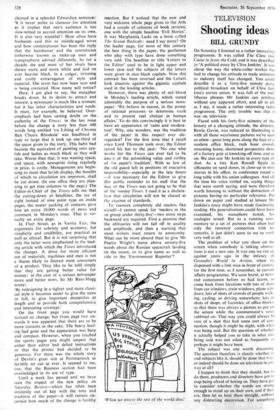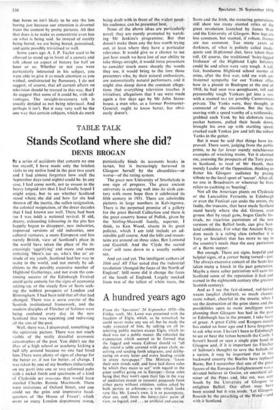TELEVISION
Shooting ideas
BILL GRUNDY
On Saturday I listened to a rather interesting programme. It was called The Class that Caine in from the Cold, and it was described as 'A political essay by Clive Jenkins'. It was about the way the white-collar worker has had to change his attitude to trade unionism as industry itself has changed. You could describe it as a forty-five minute party political broadcast on behalf of Clive Jen-
kins's ASTMS union. It was full of the mel- lifluous phrases Mr Jenkins can produce without any apparent effort, and all in all, as I say, it made a rather interesting radio programme. The only trouble was that it was on television.
Faced with his forty-five minutes of the history of a changing attitude, the director,
Barrie Gavin, was reduced to illustrating it with all those wearisome pictures we've seen so often—great long pans along the face of a modern office block, rush hour crowds streaming home, shortened perspective shots of a factory gate at knocking-off time, and so on. We also saw Mr Jenkins in every type of shot. As a tiny Ken Russell figure in silhouette on sand dunes, in close-up in shirt sleeves in his office, in conference round a long table with his union colleagues. And all the time his voice rattled on, saying things that were worth saying, and were therefore worth listening to without the distraction of pictures having no particular relevance. Put down on paper and studied at leisure Mr Jenkins's essay might have made fascinating reading. His generalisations could have been examined, his metaphors tasted, his analogies tested. But as a running com- mentary to a set of pictures that often had only the remotest connection with his remarks, it just didn't seem to me to work very well at all.
The problem of what you show on the screen when somebody is talking abstrac- tions is not a new one. It was one we ran up against years ago in the infancy of Granada's World in Action, when we dispensed with a link man in front of camera for the first time, as I remember, in current affairs programmes. We soon learnt, as news- reel cameramen before us had learnt, to come back from locations with lots of shots from car windows, train windows, plane win- dows; lots of shots of crowds of people walk- ing, cycling, or driving somewhere; lots of shots of shops, of factories, of office blocks. so that there was always a picture to put on the screen while the commentator's voice rabbited on. That way you could always be sure of a shot that had some sort of con- nection, though it might be slight, with what was being said. But the question of whether it actually helped you to take in what was being said was not asked as frequently as perhaps it might have been.
The subject was one worth discussing. The question therefore is clearly whether it. and subjects like it, should be done that way. or indeed should be done on television in any way at all?
I happen to think that they should, but to do them, producers and directors have got to stop being afraid of boring us. They have got to Consider whether the words are strong enough to stand up on their own, and if they are, then let us hear them straight, without any distracting decoration. For something
that bores us isn't likely to be any the less boring just because our attention is diverted from the content by pretty pictures. All that that does is to make us concentrate even less on what is being said. So instead of merely being bored, we are being bored, patronised, and quite possibly trivialised as well.
Some years ago A. J. P. Taylor used to be allowed to stand up in front of a camera and talk about an aspect of history for half an hour or so. Whether or not you were particularly interested in his subject, you were able to give it as much attention as you wished, undistracted by flummery. I do not suggest, of course, that all current affairs on television should be treated in this way. But I do suggest that some of it could be, with ad- vantages. The straight-to-camera talk is usually derided as not being televisual. And perhaps it isn't. But it may very well be the one way that certain subjects, which do merit being dealt with in front of the widest possi- ble audience, can be presented best.
None of the above ideas are particularly novel; they are merely prompted by watch- ing • Mr Jenkins's programme. But that doesn't make them any the less worth trying out, at least where they have a particular relevance. It would give us a chance to see just how much we have lost of our ability to take things straight, it would force presenters to consider much more sharply the words they use, it would bring to the fore those presenters who, by their natural enthusiasm, are automatically natural performers, and it might also damp down the constant allega- tions that everything television touches it trivialises; allegations that I see were made again a few days ago by Mr John Stone- house, a man who, as a former Postmaster- General, ought to know better, but obvi- ously doesn't.



































 Previous page
Previous page